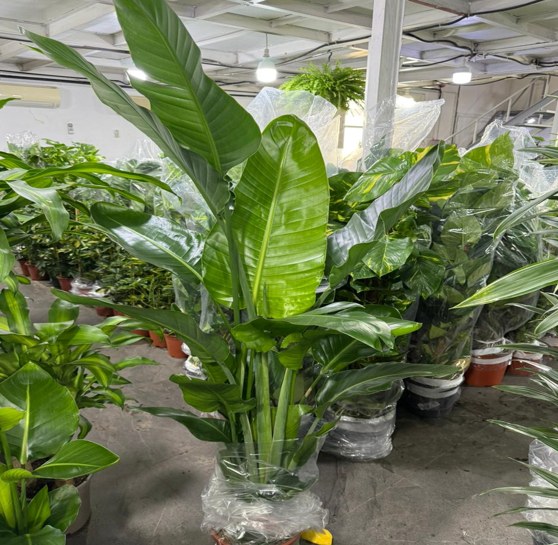Strelitzia nicolai, commonly known as the giant white bird of paradise or simply bird of paradise, is a striking tropical plant known for its dramatic foliage and stunning flowers. Here’s a detailed overview:
Description
- Leaves: The plant features large, paddle-shaped leaves that can grow up to 3 feet (90 cm) long and 1 foot (30 cm) wide. The leaves are dark green and have a beautiful, glossy finish, creating a lush, tropical appearance.
- Growth Habit: Strelitzia nicolai can reach heights of 10-20 feet (3-6 meters) outdoors, but it usually stays smaller indoors. It has a clumping growth habit and can be grown as a focal point in larger spaces.
Care Tips
- Light: This plant thrives in bright, indirect light but can tolerate some direct sunlight. Insufficient light may result in leggy growth and fewer blooms.
- Watering: Water thoroughly, allowing the top few inches of soil to dry out between waterings. Overwatering can lead to root rot, so ensure good drainage.
- Humidity: Strelitzia nicolai prefers higher humidity levels. If your home is dry, consider misting the leaves or placing the pot on a humidity tray.
- Temperature: Ideal temperatures range from 65-80°F (18-27°C). Protect the plant from frost and cold drafts.
Potting and Soil
- Medium: Use a well-draining potting mix, such as a blend designed for tropical plants or a mix of potting soil with perlite and sand for improved drainage.
- Repotting: Repot every 2-3 years or when the plant becomes root-bound, preferably in spring.
Fertilization
- Schedule: Fertilize with a balanced, water-soluble fertilizer every 4-6 weeks during the growing season (spring and summer). Reduce feeding in the fall and winter.
- Dilution: Use a half-strength solution to prevent over-fertilization.
Pests and Problems
- Common Pests: Watch for spider mites, mealybugs, and aphids. Regularly inspect the leaves for signs of pests and wipe them down to keep them clean.
- Leaf Issues: Yellowing leaves can indicate overwatering, while brown tips may suggest underwatering or low humidity.
Toxicity
Strelitzia nicolai is generally considered non-toxic to pets and humans, making it a safe choice for households with animals and children.
Have a look at our outdoor plant collectionhttps://mfourgreen.com/product-category/outdoor-plants/

Reviews
There are no reviews yet.